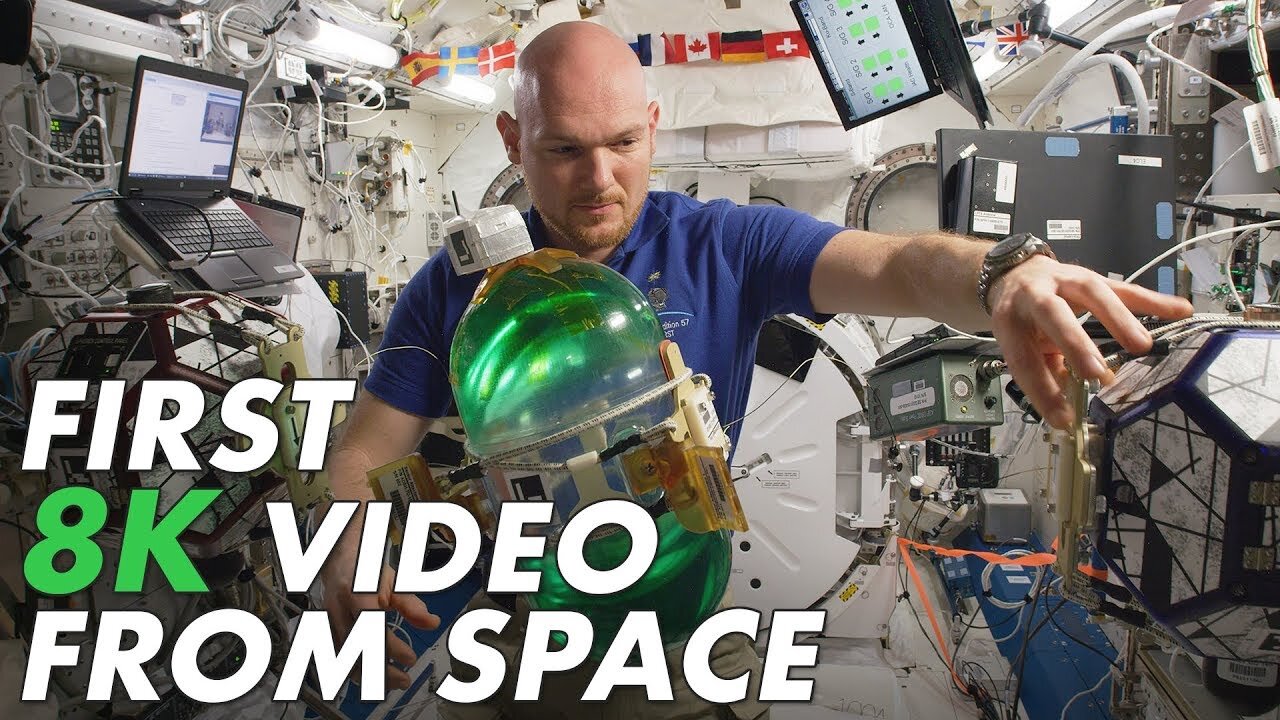Premium Only Content

First 8K Video from Space - Ultra HD
Science gets scaled up with the first 8K ultra high definition (UHD) video from the International Space Station. Get closer to the in-space experience and see how the international partnership-powered human spaceflight is improving lives on Earth, while enabling humanity to explore the universe. More: https://go.nasa.gov/2zgPY5o Special thanks to the European Space Agency, the ISS National Lab, and astronauts Alexander Gerst, Serena Auñón-Chancellor, Ricky Arnold and Drew Feustel.
Download this video: https://images.nasa.gov/details-First-8K-Video-from-Space.html
Featured investigations and facilities:
0:01, 2:36 BEST seeks to advance use of sequencing DNA and RNA in space. https://go.nasa.gov/2tNntKu
0:13 The Minus Eighty-Degree Laboratory Freezer for ISS (MELFI) is a cold storage unit that maintains experiment samples at ultra-cold temperatures throughout a mission. https://go.nasa.gov/2RkJAl5
0:21 The Advanced Plant Habitat (APH), a recent addition to the space station, is the largest growth chamber aboard the orbiting laboratory. https://go.nasa.gov/2JCi8vV
0:33 Canadarm2 is part of Canada's contribution to the space station. This 17-metre-long robotic arm was extensively involved in the assembly of the orbiting laboratory. https://go.nasa.gov/2ReaU42
0:41 Crew Earth Observations record how the planet is changing over time, from human-caused changes like urban growth and reservoir construction, to natural dynamic events such as hurricanes, floods and volcanic eruptions. https://go.nasa.gov/2KLFAaq
0:49 The Light Microscopy Module (LMM) is a modified commercial, highly flexible, state-of-the-art light imaging microscope facility that provides researchers with powerful diagnostic hardware and software onboard the space station. https://go.nasa.gov/2RfdYwS
0:53 ACE-T-2 looks at the assembly of complex structures from micron-scale colloidal particles interacting via tunable attractive interactions. https://go.nasa.gov/2Re2ppS
0:57 Plant Habitat-1 comprehensively compares differences in genetics, metabolism, photosynthesis, and gravity sensing between plants grown in space and on Earth. https://go.nasa.gov/2MdDBfc
1:05 The Cupola provides an observation and work area for the International Space Station crew that gives visibility to support the control of the station’s robotic arms, and a beautiful view of the Earth, celestial objects and visiting vehicles. https://go.nasa.gov/2CRsxCT
1:14 Atomization observes the disintegration processes of low-speed water jets under various conditions to improve spray combustion processes inside rocket and jet engines. https://go.nasa.gov/2RkKrlN
1:30 BCAT-CS focuses on the study of forces between particles that cluster together by studying sediments of quartz and clay particles. https://go.nasa.gov/2p6WBSV
1:38 Functional Immune analyzes blood and saliva samples to determine the changes taking place in crew members’ immune systems during flight. https://go.nasa.gov/2RfUMz1
2:03 Life Support Rack (LSR) is a technology demonstrator for closed loop air revitalization. https://go.nasa.gov/2Rdfi3C
2:15 The Japanese Experiment Module Airlock is used to deliver science experiments to external platforms, and prepare small satellites for deployment from station. https://go.nasa.gov/2RdcBik
2:23 SPHERES Tether Slosh combines fluid dynamics equipment with robotic capabilities aboard the space station to investigate automated strategies for steering passive cargo that contain fluids. https://go.nasa.gov/2RfQPdQ
Follow updates on the science conducted aboard the space station on Twitter:
https://twitter.com/iss_research
For more information on how you can conduct your research in microgravity, visit https://go.nasa.gov/2q84LJj
-
 58:00
58:00
Donald Trump Jr.
6 hours agoBreaking News on Deadly Plane Crash, Plus Hearing on the Hill, Live with Rep Cory Mills & Sen Marsha Blackburn | TRIGGERED Ep.212
64.4K54 -
 52:03
52:03
Kimberly Guilfoyle
5 hours agoLatest Updates on Deadly Air Collision, Plus Major Hearings on Capitol Hill,Live with Marc Beckman & Steve Friend | Ep.192
37.7K22 -
 1:26:50
1:26:50
Redacted News
3 hours agoWhat happened? Trump DESTROYS the Pete Buttigieg run FAA for tragic airline crash | Redacted News
152K108 -
 43:37
43:37
Candace Show Podcast
3 hours agoThe Taylor Swift Plot Thickens | Candace Ep 142
84.2K74 -
 LIVE
LIVE
Common Threads
1 hour agoLIVE DEBATE: Trump's Wild Handling of Plane Tragedy
155 watching -
 LIVE
LIVE
LFA TV
8 hours agoConfirmation Chaos | TRUMPET DAILY 1.30.25 7pm
656 watching -
 1:57:53
1:57:53
Revenge of the Cis
5 hours agoEpisode 1437: Kash Me Outside
38K15 -
 6:34:04
6:34:04
Dr Disrespect
7 hours ago🔴LIVE - DR DISRESPECT - WARZONE - CRAZY TRIPLE THREAT CHALLENGE
131K28 -
 3:10:10
3:10:10
Power Slap
9 days agoPower Slap 11: Da Crazy Hawaiian vs Dumpling 2 | Thursday January 30th 12pET/9aPT
3.58M134 -
 1:19:18
1:19:18
Dr. Drew
7 hours agoDr. Peter McCullough: RFK Jr. Faces Senate Hearing Circus, As 81,000 Doctors & Experts Publish New Demand For COVID-19 Vaccine Recall – Ask Dr. Drew
94.5K27